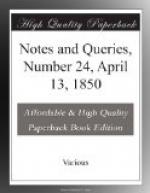W.R.F.
A Chip in Porridge.—What is the origin and exact force of this phrase? Sir Charles Napier, in his recent general order, informs the Bengal army that
“The reviews which the
Commander-in-Chief makes of the troops
are not to be taken as so
many ‘chips in porridge.’”
I heard a witness, a short time since, say, on entering the witness-box—
“My Lord, I am like a ‘chip
in porridge’; I can
say nothing either for or against the
plaintiff.”
Q.D.
Temple Stanyan.—Who was Temple Stanyan, concerning whom I find in an old note-book the following quaint entry?
“Written on a window
at College, by Mr. Temple Stanyan, the
author of a History of
Greece:—
“Temple Stanyan, his window.
God give him grace thereout to look!
And, when the folk walk to and fro’,
To study man instead of book!”
A.G.
Tandem.—You are aware that we have a practical pun now naturalised in our language, in the word “tandem.” Are any of your correspondents acquainted with another instance?
[Greek: Sigma].
“As lazy as Ludlum’s dog, as laid him down to bark.”—This comparison is so general and familiar in South Yorkshire (Sheffield especially) as to be frequently quoted by the first half, the other being mentally supplied by the hearer. There must, of course, be some legend of Ludlum and his dog, or they must have been a pair of well-known characters, to give piquancy to the phrase. Will any of your readers who are familiar with the district favour me with an explanation?
D.V.S.
Anecdote of a Peal of Bells.—There is a story, that a person had long been absent from the land of his nativity, where in early life, he had assisted in setting up a singularly fine peal of bells. On his return home, after a lapse of many years, he had to be rowed over some water, when it happened that the bells struck out in peal; the sound of which so affected him, that he fell back in the boat and died! Can any of your readers give a reference where the account is to be met with?
H.T.E.
Sir Robert Long.—“ROSH.” inquires the date of the death of Rear-Admiral Sir Robert Long, who founded, in 1760, a Free School at Burnt-Yates, in the Parish of Ripley, co. Yorks., and is said to have died in Wigmore Street, London, it is supposed some years after that period.




